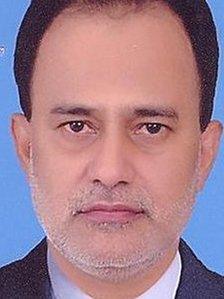Dozens die after Karachi MP Raza Haider shot
- Published
Buses were torched during the violence
At least 45 people have been killed in the southern Pakistani city of Karachi in violence which erupted after an MP was shot dead at a funeral in a mosque.
More than 100 people were also wounded in the rioting that followed the death of Raza Haider, of the MQM party.
The city, Pakistan's business and commercial capital, virtually ground to a halt for his funeral.
More than 300 people have died in political killings in Karachi this year, say human rights organisations.
Pakistan's Prime Minister Yousuf Raza Gilani has appealed for calm and ordered an investigation into the assassination.
Haider, a Sindh provincial assembly member, was performing ablutions in a mosque near the city centre on Monday when he was shot dead by four gunmen, according to witnesses. His guard was also killed.
Police in Karachi say they have arrested about a dozen suspects in connection with the murders.
Schools were shut and most businesses closed on Tuesday in the port city of more than 16 million people.
The BBC's Syed Shoaib Hasan in Karachi says the city remains in the grip of fear, with reports of gunmen continuing to patrol several neighbourhoods, although security forces are now beginning to regain control.
Meanwhile, thousands of angry mourners chanted slogans as Haider's coffin, draped with the MQM (Muttahida Qaumi Movement) party banner, was brought out for his funeral in central Karachi.
Although the MQM leadership has now appealed for restraint to end the cycle of revenge attacks, our correspondent says this may have come too late as the death toll continues to rise.

Raza Haider's killing was described by colleagues as a "heinous act"
In the immediate aftermath of the shooting, senior members of the MQM vowed to retaliate, and gunmen soon appeared on the streets targeting civilians, while rioters attacked property and vehicles.
Our correspondent says most victims of the mob violence were from the Pashtun community. Pashtun businesses, as well as journalists, have also been targeted.
MQM officials had claimed supporters of the rival Awami National Party (ANP), which is dominated by the Pashtun community, were responsible for the assassination.
The MQM and ANP are part of Pakistan's governing coalition, which is led by President Asif Ali Zardari's Pakistan People's Party.
But security officials in Karachi told the BBC there was evidence the shooting was carried out by the Lashkar-e-Jhangvi, Pakistan's deadliest militant group.
It has links to al-Qaeda and many of its leaders are based in Pakistan's tribal region.